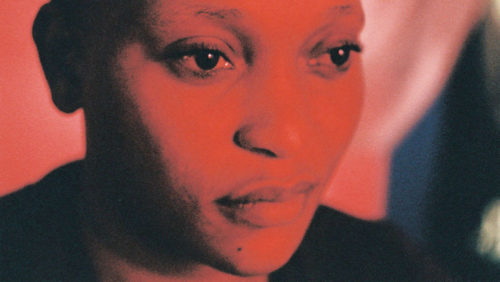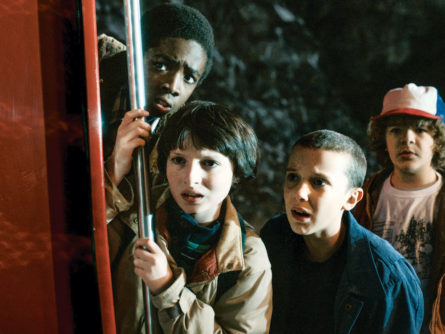
Follow “Indie Prof” on Facebook for updates about film events and more reviews. Follow “Indie Prof” on Facebook for updates about film events and more reviews. Each month the Indie Prof reviews films in theaters and on DVD or streaming services.
Follow “Indie Prof” on Facebook for updates about film events and more reviews.
Felicité (2017—Senegal)

Felicité
Not long ago, Senegal was one of the top filmmaking countries in the world. Senegal native and filmmaking legend Ousmane Sembene was primarily responsible for the rise and apex of the industry in his native country, but he passed away in 2007 and the industry fell on hard times. Losing its voice and leader, the country then lost many of its theaters in an economic downturn. The once flourishing industry is now making a comeback, and we are starting to see more cinema from this proud country. Felicité, directed by Alain Gomis and starring the wonderful Véro Tshanda Beya Mputu as the titular character, is the highlight of this re-emergence.
The film tells the story of Felicité, a singer in a small bar and a single mother living in Kinshasa. The opening sequence in the bar is lively, enigmatic, alluring, and engrossing. The rest of the film, while see-sawing between frenetic and thoughtful, will retain the wonderful humanist qualities from that opening sequence and always recall the elegance, ebullience, and defiance of Sembene’s cinema. This is a film that deserves to be felt as much as watched, and the emotions and rhythms—both of the film and the music therein—track the action beautifully.
The plot turns early in the film as Felicité learns that her son is in the hospital after an accident. Just getting to the hospital is an adventure through the streets of Kinshasa, but once there, she finds that her son may lose his leg if not operated on immediately. The catch: she has to pay an unruly amount of money, in cash, right away. Of course, she doesn’t have the money, and she has to (literally) fight and scrape for it. She gets some help, but her strong will and passion rule the day. Still, nothing ends tidily in this world.
The film is wonderfully shot, with an abundance of close-ups on Mputu; the director knew what he had in her and concentrated his camera on her wonderful performance. The close-ups have the effect of getting us “close” to the character and enveloping us in her world. That world may be small, but it is dense and complicated. The cinematography is also beautiful, vacillating between dusty realism and darker, stylized sequences. The aforementioned music is omnipresent and lush, and serves as “a chorus,” according to director Gomis: “it’s a way of saying ‘Once upon a time …’ and having a distance, to allow the film to be something other than a social drama, and to produce a dialogue between the viewer and the film.”
That dialogue is a breath of fresh air.
You’ll enjoy this film if you liked Boyhood, Girlhood, and/or Hidden Figures.
Opens 12/8 at the Sie Film Center.
Stranger Things 2 (Netflix)
“Are you always so serious, Piturro? (sometimes)
“Do you only watch dark, disturbing films?” (mostly)
“Do you ever watch comedies?” (never)

Stranger Things
These are typical questions (and my answers) I receive from readers and students. Most think I sit around in dark rooms watching dreary and devastating films every night (that is partially correct). But I do have a sense of humor, and I do have my guilty pleasures. Stranger Things is one of them, and some of that is because I grew up during the time period depicted in the film. And yes, if you’ve seen season one, the ’80s are still very much alive in season two; only this time so much so that they become a character in the film, sometimes even annoyingly so. But the charms of season one that made the show the sleeper hit that eventually caught fire are still there: the quirky storytelling, the ridiculous plot, the sorely lacking parents, the ’80s backdrop, and the wonderful cast of kids. Oh those kids!
Seasons two of many shows falter when they either try to copy exactly what they did in season one or rather, do a complete U-turn from season one. The best sequels give us just enough of the good stuff from the original and add a dash of change and a spoonful of spice. Stranger Things 2 does just that: we get two new (substantial) characters in Joyce’s boyfriend Bob (Sean Astin), and Max (Sadie Sink), a (gasp!) girl who is added to “the party,” as the boys call themselves. We also get more of the bad guys—who turn into not-so-bad-guys along the way—and we get more of the “upside-down” as well. The most lauded aspect of season one, however, is where season two also shines: Mille Bobbie Brown. Brown is again sparkling as Eleven. She and the boys really carry the show and remain the heart of the show. And that is exactly why you should turn off The Cure for a few minutes and get binging on Stranger Things 2! Totally.
You will enjoy this show if you enjoyed the first season of Stranger Things, Stand by Me, and/or Super 8.
Now awaiting your binge on Netflix.
Vincent Piturro, Ph.D., is an associate professor of Cinema Studies at Metropolitan State University of Denver. He can be reached at vpiturro@msudenver.com.



0 Comments